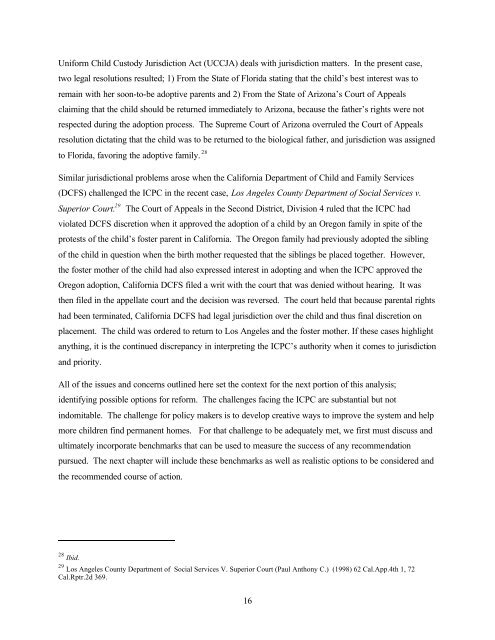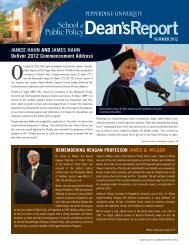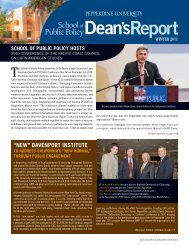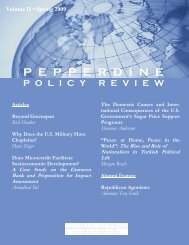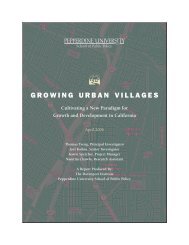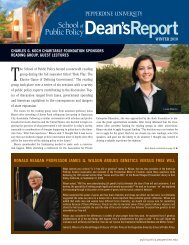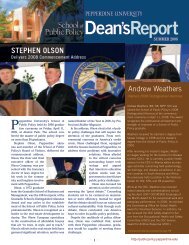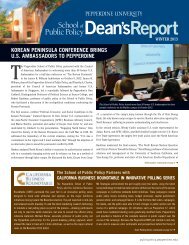Finding Permanent Homes for Adoptable Children - Pepperdine ...
Finding Permanent Homes for Adoptable Children - Pepperdine ...
Finding Permanent Homes for Adoptable Children - Pepperdine ...
You also want an ePaper? Increase the reach of your titles
YUMPU automatically turns print PDFs into web optimized ePapers that Google loves.
Uni<strong>for</strong>m Child Custody Jurisdiction Act (UCCJA) deals with jurisdiction matters. In the present case,<br />
two legal resolutions resulted; 1) From the State of Florida stating that the child’s best interest was to<br />
remain with her soon-to-be adoptive parents and 2) From the State of Arizona’s Court of Appeals<br />
claiming that the child should be returned immediately to Arizona, because the father’s rights were not<br />
respected during the adoption process. The Supreme Court of Arizona overruled the Court of Appeals<br />
resolution dictating that the child was to be returned to the biological father, and jurisdiction was assigned<br />
to Florida, favoring the adoptive family. 28<br />
Similar jurisdictional problems arose when the Cali<strong>for</strong>nia Department of Child and Family Services<br />
(DCFS) challenged the ICPC in the recent case, Los Angeles County Department of Social Services v.<br />
Superior Court. 29 The Court of Appeals in the Second District, Division 4 ruled that the ICPC had<br />
violated DCFS discretion when it approved the adoption of a child by an Oregon family in spite of the<br />
protests of the child’s foster parent in Cali<strong>for</strong>nia. The Oregon family had previously adopted the sibling<br />
of the child in question when the birth mother requested that the siblings be placed together. However,<br />
the foster mother of the child had also expressed interest in adopting and when the ICPC approved the<br />
Oregon adoption, Cali<strong>for</strong>nia DCFS filed a writ with the court that was denied without hearing. It was<br />
then filed in the appellate court and the decision was reversed. The court held that because parental rights<br />
had been terminated, Cali<strong>for</strong>nia DCFS had legal jurisdiction over the child and thus final discretion on<br />
placement. The child was ordered to return to Los Angeles and the foster mother. If these cases highlight<br />
anything, it is the continued discrepancy in interpreting the ICPC’s authority when it comes to jurisdiction<br />
and priority.<br />
All of the issues and concerns outlined here set the context <strong>for</strong> the next portion of this analysis;<br />
identifying possible options <strong>for</strong> re<strong>for</strong>m. The challenges facing the ICPC are substantial but not<br />
indomitable. The challenge <strong>for</strong> policy makers is to develop creative ways to improve the system and help<br />
more children find permanent homes. For that challenge to be adequately met, we first must discuss and<br />
ultimately incorporate benchmarks that can be used to measure the success of any recommendation<br />
pursued. The next chapter will include these benchmarks as well as realistic options to be considered and<br />
the recommended course of action.<br />
28 Ibid.<br />
29 Los Angeles County Department of Social Services V. Superior Court (Paul Anthony C.) (1998) 62 Cal.App.4th 1, 72<br />
Cal.Rptr.2d 369.<br />
16


